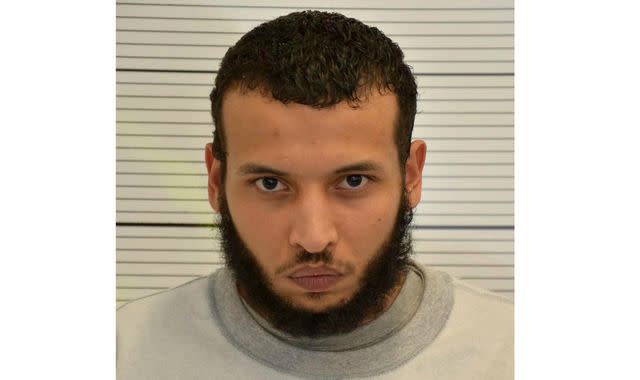Khairi Saadallah: MI5 'triaged' terrorist four times but Reading stabbings could not have been stopped, inquest hears

MI5 "triaged" a violent offender four times before he carried out a terrorist knife attack and killed three men in a park in Reading, an inquest has heard.
The agency received intelligence including threats by Khairi Saadallah to "blow himself up" and to "commit suicide and "take others with him" if he was not allowed to travel to Libya, the hearing was told.
On the last occasion, a year before the attack, the security service opened a "lead" investigation into Saadallah and made him a "subject of interest" - but the case was closed two months later.
However, a "senior manager" at MI5, known only as "Witness F" and who gave evidence from behind a blue screen at the Old Bailey, said the agency could not have stopped the attack.
Saadallah, 25, stabbed to death three men who were meeting in Forbury Gardens, Reading, 15 days after his release from prison on licence.
History teacher James Furlong, 36, pharmaceuticals manager Joseph Ritchie-Bennett, 39, and scientist David Wails, 49, were killed and three others injured on Saturday 20 June 2020.
Saadallah, who was later handed a whole life tariff, had viewed ISIS material before the attack and was heard yelling "Allahu Akbar" [God is great] and "God accept my jihad".
'Significant bundle'
Witness F told the inquest: "Given the intelligence, no proportionate actions we could have taken would have changed the outcome."
Saadallah arrived in Britain in September 2012 on a visitor's visa and claimed asylum, telling the immigration service that he had been a member of an Islamist militia called Ansar al Sharia, and producing an ID card to prove it.
An immigration tribunal found that pictures he submitted proved that he had been fighting for the group and rejected his claim, although he then launched a series of appeals.
The group was proscribed in Britain two years later, following its involvement in the killing of the US ambassador Christopher Stevens in Benghazi.
The Home Office did not pass the information to MI5, although they eventually received the intelligence as part of a "significant bundle" seven years later.
In 2015, counter-terrorism police in Manchester received intelligence that Saadallah had been a member of the February 17 Martyrs' Brigade, another Islamist militia.
In early 2017, Saadallah was seen associating in prison with Omar Brooks, a radical preacher known as Abu Izzadeen, but it was a "matter of some concern" that that information was not shared with the security service either, the inquest was told.
'Surprising and concerning'
MI5 conducted their first "triage" exercise in late 2017 after information was received from HMP Bullingdon, in Oxfordshire, that Saadallah had been involved in affray. He had also reportedly said he wanted to kill himself, and had aspirations to return to Libya and engage in violence.
It was decided that the information did not meet the "threshold for investigation" Nicholas Moss KC, counsel to the inquest said.
In May 2018 a second triage exercise was conducted after counter-terrorism police passed on intelligence that Saadallah wanted to "start a revolution" in Libya on 13 December and then "return to Britain and blow himself up".
It said he had been a "member of the Libyan Army" and received "limited military training".
Read more from Sky News:
Aristocrat 'debated whether to cremate baby with petroleum'
Sunak appearance on GB News investigated
Drug dealer who doled out Christmas party bags jailed
However, MI5 was incorrectly told that Saadallah was to be deported and decided that he would have no means of returning to Britain - and therefore "no further action was required".
By the time the decision was made, he had already been released, the inquest was told.
Witness F agreed that it was "very important that when decisions such as this are taken that the information is correct".
The third and penultimate triage assessment was made in December 2018 after MI5 received information that, while in custody, Saadallah had said he wanted to return to Libya and become involved in violence to support his family.
He also reportedly said he intended to "commit suicide and ensure others died in the process" if he was not deported.
MI5 assessed that the threat of violence "did not amount to a terrorist intent or ideology".
Mr Moss told the inquest it was "surprising and concerning that the substance of earlier triage assessments may not have been taken into account".
The inquest continues.


